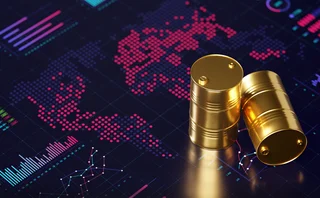
Ex-Barclays fixed income head builds commodity hedge fund
Lamorre-Cargill seeks to entice investors back to commodities with Argon

Aurelia Lamorre-Cargill admits that commodities have not been "the favourite place for investors in the last few years". Still, she is the co-founder and chief executive of Argon Capital Management, a new hedge fund management firm that will focus on the beleaguered asset class. It aims to raise $300 million in initial funding.
"Commodities have been through a very rough patch," she says. "But I hope in the next year, I'll be able to say that [launching Argon] wasn't just a visionary view. I think the need is there."
Lamorre-Cargill and her partner, Marcos Bueno, started Argon last year just as investors were fleeing commodities in droves. Total assets under management (AUM) in commodities fell from $451 billion in 2012 to $161 billion in 2015, although that number has rebounded to $220 billion as of April, according to Barclays. Commodity hedge funds have also had a rough time lately: net returns for hedge funds in commodities were –7.24% in 2015, and there were a record 17 liquidations of commodity hedge funds last year, according to London-based data provider Preqin.
Against that backdrop, Argon is betting that now is the time to launch a new fund. In March, the firm announced the hiring of half-a-dozen portfolio managers (PMs), including former traders from multibillion-dollar commodity hedge funds Blenheim Capital Management and Ospraie Management. Leading the team are Bueno, the chief investment officer (CIO), who previously worked as a partner and senior portfolio manager at Graham Capital Management, and Lamorre-Cargill, who was global head of fixed-income structuring at Barclays when she left the bank in 2013.
Not a commodities specialist herself – and a rare woman at the top of a commodity hedge fund – Lamorre-Cargill sees her role as moulding Argon to meet the needs of institutional investors, who may be uncomfortable with the asset class. "Managing capital funding and commercial management are not in the DNA of commodities traders, and that's something I can bring," she says.
Commodities have been through a very rough patch. But I hope in the next year, I'll be able to say that [launching Argon] wasn't just a visionary view. I think the need is there
Aurelia Lamorre-Cargill, Argon Capital Management
A distant relative of the family behind Cargill, the US-based agricultural commodities trading giant, Lamorre-Cargill started her career in 1996 as a Paris-based analyst at JP Morgan. Two years later, she relocated to London and switched to a new role within the bank focusing on credit derivatives. "It was a very exciting and interesting time," she recalls. "When you wanted to do a new trade in credit, there was no real documentation. You had to build a model and pretty much do everything from scratch, so it was very challenging."
In 2002 she joined Deutsche Bank, where she worked on developing iTraxx credit indexes and related derivatives and was promoted to managing director after two years. She left for Barclays in 2007. Initially, she focused on building out the UK bank's interest rates structuring business.
As problems mounted in the US subprime mortgage market, getting out of credit proved to be a good career move. "When I left Deutsche, everybody looked at me and said, ‘you're completely crazy to go to rates,'" Lamorre-Cargill says. "By the end of 2007, everybody was looking at me and saying, ‘you're a genius because you're not doing credit anymore.'"
At Barclays, Lamorre-Cargill helped launch quantitative index strategies that clients could access via swaps, without entering the funds space. Working with big institutional investors helped give her a sense of what such firms were lacking – including good ways to invest in commodities. Many such firms wanted exposure to the asset class, but commodity hedge funds were often too small or undiversified to meet the requirements of big asset managers and pension funds, she found. The notorious volatility of commodity markets was also a problem.
All that helped shape Lamorre-Cargill and Bueno's vision for Argon. "We didn't start by saying, ‘we're a hedge fund trading gas or energy,'" she says. "We started by saying, ‘what are the issues for investors to be able to approach commodities? If we had to start from a blank piece of paper, what would be the best way to approach it to serve the investors?'"
That's why Argon was conceived as a multi-strategy fund whose PMs have specialities ranging from energy to metals to agricultural commodities. Another one of Argon's selling points is risk management: Bueno, as CIO, will oversee risk across the individual PM's books, working jointly with Argon's chief risk officer, Jeffrey Halpern, who was previously head of risk management at Moore Capital Management, the venerable US hedge fund. That will make Argon better at managing risk than many other commodity funds, where risk managers typically report to the traders, Lamorre-Cargill says.
Will all that draw investors to Argon? Lamorre-Cargill voices optimism. "I've spent 20 years looking at what the next step is for the markets, so hopefully I have a bit of intuition in terms of where things might go," she says. "And I think the market perception of commodities is much more positive than it was six months ago."
Biography – Aurelia Lamorre-Cargill
1996–2002: Vice-president, JP Morgan
2002–04: Director and co-head of interest rate structuring, Deutsche Bank
2004–07: Managing director and co-head of strategic solutions group, Deutsche Bank
2007–13: Managing director, head of fixed-income structuring Europe and (from 2008) global head of fixed income structuring, Barclays Capital
2015–present: CEO, Argon Capital Management
Only users who have a paid subscription or are part of a corporate subscription are able to print or copy content.
To access these options, along with all other subscription benefits, please contact info@risk.net or view our subscription options here: http://subscriptions.risk.net/subscribe
You are currently unable to print this content. Please contact info@risk.net to find out more.
You are currently unable to copy this content. Please contact info@risk.net to find out more.
Copyright Infopro Digital Limited. All rights reserved.
As outlined in our terms and conditions, https://www.infopro-digital.com/terms-and-conditions/subscriptions/ (point 2.4), printing is limited to a single copy.
If you would like to purchase additional rights please email info@risk.net
Copyright Infopro Digital Limited. All rights reserved.
You may share this content using our article tools. As outlined in our terms and conditions, https://www.infopro-digital.com/terms-and-conditions/subscriptions/ (clause 2.4), an Authorised User may only make one copy of the materials for their own personal use. You must also comply with the restrictions in clause 2.5.
If you would like to purchase additional rights please email info@risk.net
More on Commodities
Energy Risk Asia Awards 2024: The winners
Winning firms adapt to change with exemplary risk management skills
Foreign funds are bulls in China’s onshore commodity futures
Growing participation from overseas investors is boosting liquidity in what’s already a boom market
Energy Risk Software Rankings 2024: IT demands increase amid rising risk
Heightened geopolitical and credit risk increase requirements on commodities software
Energy Risk Asia Awards 2023: The winners
Winning firms demonstrate resilience and robust risk management amid testing times
ION Commodities: addressing the market’s recent pain points
Energy Risk Software Rankings winner’s interview: ION Commodities
Energy Risk Commodity Rankings 2023: adapting to new market dynamics
Winners of the 2023 Commodity Rankings provided reliability when clients faced extreme change
Energy Risk Software Rankings 2023: managing uncertainty
Unpredictable markets make CTRM software choices key
Navigating the volatility and complexity of commodity markets
Commodity markets have experienced significant challenges since the Covid-19 pandemic, the conflict in Ukraine and the subsequent sanctions imposed on Russia. These unprecedented events have caused fluctuations in supply and demand, disrupted global…








